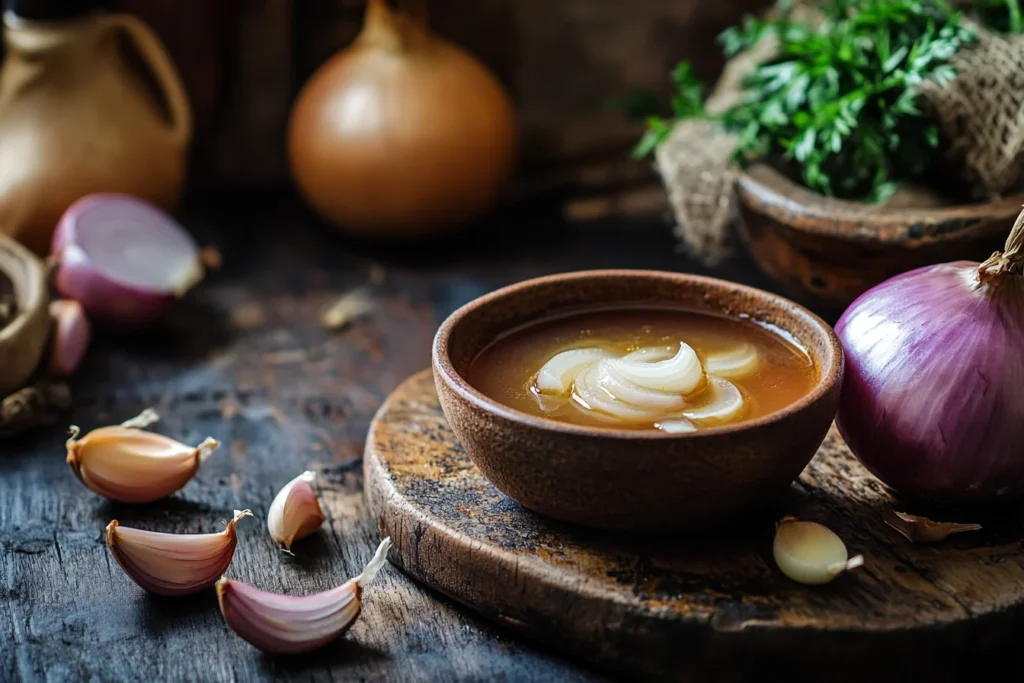Why Is Onion Soup Healthy?
Onion soup is not just a comfort food; it’s a nutrient-packed dish with significant health benefits. Why is onion soup healthy? First, it contains antioxidants like quercetin and sulfur compounds, which support heart health, reduce inflammation, and boost immunity. Another reason why onion soup is healthy is its prebiotic fiber content, promoting a balanced gut microbiome and improved digestion.
Why is onion soup healthy compared to other soups? Its low-calorie yet nutrient-rich profile makes it an excellent choice for those seeking flavorful meals with health benefits. Now that you know why onion soup is healthy, add it to your diet today!
Nutritional Profile of Onion Soup
Macronutrients: Carbs, Protein, and Fat Content
Onion soup, a classic comfort dish, is celebrated not only for its rich, savory taste but also for its nutritional value. Its macronutrient profile makes it a balanced and wholesome choice. Here’s a detailed breakdown:
1. Carbohydrates
- Source: The primary source of carbohydrates in onion soup comes from onions and any added ingredients like bread or croutons traditionally served with it.
- Content: A typical serving of onion soup (about one cup) contains approximately 15–20 grams of carbohydrates, depending on the recipe.
- Onions contribute natural sugars that caramelize during cooking, enhancing flavor without excessive calories.
- If served with bread or croutons, the carbohydrate content may increase significantly, potentially adding another 10–20 grams per serving.
2. Protein
- Source: The protein in onion soup is generally minimal unless enhanced with additional protein-rich ingredients such as cheese, meat stock, or plant-based protein alternatives.
- Content: A standard serving of onion soup contains about 3–5 grams of protein.
- Cheese toppings, such as Gruyère or Parmesan, can contribute an additional 4–6 grams per serving.
- Using bone broth or meat-based stocks can increase the protein content to around 6–8 grams per cup.
3. Fat
- Source: Fats in onion soup are typically derived from the butter or oil used for caramelizing the onions and any cheese or cream added for richness.
- Content: A serving of onion soup usually contains 5–10 grams of fat.
- Butter or olive oil adds healthy fats, especially when used in moderation.
- Cheese toppings can introduce saturated fats, though they also bring vital nutrients like calcium.
Key Nutritional Highlights
- Low-Calorie: Despite its rich flavor, onion soup can be low in calories (150–250 kcal per serving) when prepared with minimal added fats and without heavy toppings.
- Fiber: Onions are a good source of dietary fiber, contributing 2–3 grams per serving, which aids digestion.
- Rich in Antioxidants: Onions are packed with quercetin and sulfur compounds, known for their anti-inflammatory and immune-boosting properties.
Onion soup strikes a delightful balance of macronutrients, making it a versatile dish that can fit into various dietary plans, from low-calorie diets to heartier, protein-rich meals.
Health Benefits of Onions

Antioxidant Properties: Role of Quercetin and Sulfur Compounds
Onions are not just a flavorful kitchen staple; they also boast an impressive range of health benefits, largely due to their antioxidant content. The primary compounds responsible for these benefits are quercetin and sulfur compounds, both of which contribute to improving overall health and preventing various chronic conditions.
1. Quercetin: A Powerful Antioxidant
- What is Quercetin?
Quercetin is a flavonoid found in high concentrations in onions, particularly in red and yellow varieties. It is known for its potent antioxidant properties, which help neutralize harmful free radicals in the body. - Health Benefits of Quercetin:
- Reduces Inflammation: Quercetin combats oxidative stress, a key factor in chronic inflammation, which is linked to conditions like arthritis, asthma, and heart disease.
- Boosts Heart Health: By reducing inflammation and oxidative damage, quercetin helps lower blood pressure and improve cholesterol levels, reducing the risk of cardiovascular diseases.
- Supports Immune Function: Quercetin enhances the body’s ability to fight infections and illnesses, making it a valuable compound for maintaining overall health.
- Cancer Prevention: Studies suggest that quercetin may inhibit the growth of certain cancer cells by reducing oxidative stress and inflammation.
2. Sulfur Compounds: The Secret Weapon
- What Are Sulfur Compounds?
Onions contain sulfur-rich compounds, such as allyl sulfides and cysteine sulfoxides. These compounds are responsible for the onion’s pungent smell and many of its health-promoting properties. - Health Benefits of Sulfur Compounds:
- Detoxification Support: Sulfur compounds promote the production of glutathione, the body’s master antioxidant, aiding in the detoxification of harmful substances.
- Heart Protection: They help lower cholesterol levels and prevent blood clot formation, reducing the risk of heart attacks and strokes.
- Antibacterial Properties: Sulfur compounds have natural antibacterial effects, which can help protect against infections and improve gut health.
- Cancer-Fighting Potential: These compounds may help prevent DNA damage, inhibit tumor growth, and support the body’s natural defenses against cancer.
Synergistic Effects
The combination of quercetin and sulfur compounds in onions creates a synergistic effect, amplifying their individual benefits. Together, they act as a powerful defense against oxidative damage and chronic diseases, making onions an essential ingredient for a healthy diet.
By incorporating onions into your meals, you not only enhance flavor but also harness these natural compounds to support better health and well-being.
Why Cooking Enhances Onion’s Benefits
Cooking onions is not just a culinary technique to enhance their flavor; it also significantly improves their health benefits. The heat of cooking transforms the chemical composition of onions, making their nutrients more accessible and beneficial. Let’s explore how cooking enhances their value:
1. Breakdown of Complex Sugars: Easier Digestion and Absorption
- Natural Sugars in Onions: Onions contain complex carbohydrates, such as fructooligosaccharides and inulin, which can be challenging for some people to digest.
- Impact of Cooking:
- Heat breaks down these complex sugars into simpler forms, making them easier for the digestive system to process.
- This transformation reduces the risk of bloating or discomfort that raw onions might cause for some individuals.
- Digestive Benefits:
- Simpler sugars are more readily absorbed by the body, providing a quick source of energy.
- Cooked onions can also act as prebiotics, supporting gut health by promoting the growth of beneficial bacteria.
2. Activation of Antioxidants: Enhanced Bioavailability During Cooking
- Boosting Quercetin’s Effectiveness:
- Cooking onions can increase the bioavailability of quercetin, making it easier for the body to absorb this potent antioxidant.
- Sautéing or caramelizing onions releases quercetin into the cooking medium (such as oil or broth), enhancing its concentration in the final dish.
- Formation of New Antioxidants:
- Heat stimulates the production of additional antioxidant compounds, such as thiosulfinates and diallyl disulfide, which further boost the onion’s health benefits.
- Protection Against Free Radicals:
- These antioxidants protect the body against oxidative damage, reducing the risk of chronic diseases like cancer and heart conditions.
3. Role of Heat in Nutrient Preservation
- Gentle Cooking Preserves Nutrients:
- Light cooking methods, such as sautéing or steaming, help retain essential vitamins and minerals, like vitamin C and potassium, while also unlocking other beneficial compounds.
- Caramelization Enhances Nutritional Value:
- The caramelization process not only deepens the onion’s flavor but also amplifies the concentration of sulfur compounds, which contribute to heart health and immune support.
- Avoid Overheating:
- While moderate heat brings out the best in onions, excessive cooking can degrade some heat-sensitive nutrients, like vitamin C. Opting for shorter cooking times at moderate temperatures ensures maximum nutrient retention.
Key Takeaways
Cooking onions enhances their digestibility, boosts the bioavailability of their antioxidants, and preserves key nutrients when done correctly. Whether you sauté, roast, or caramelize onions, these processes unlock their full health potential, making cooked onions a delicious and nutrient-rich addition to any meal.
Digestive Health and Onion Soup
Onion soup is more than a comforting dish—it’s a digestive ally. Its ingredients, particularly onions, offer numerous benefits that support gut health, bowel regularity, and ease of digestion. Here’s how this hearty soup helps maintain a healthy digestive system:

1. Prebiotic Properties of Onions: Feeding Healthy Gut Bacteria
- Natural Prebiotics in Onions:
Onions are rich in fructooligosaccharides (FOS) and inulin, two types of prebiotic fibers. These compounds serve as food for beneficial gut bacteria, such as Bifidobacteria and Lactobacilli. - Benefits for Gut Microbiota:
- Promotes the growth of healthy bacteria, helping maintain a balanced gut microbiome.
- Enhances the production of short-chain fatty acids (SCFAs) like butyrate, which improve gut lining health and reduce inflammation.
- Boosts immune function through a stronger and more diverse gut microbiota.
- Why Soup Enhances Prebiotics:
Cooking onions in soup softens their fibers, making prebiotics more accessible for fermentation in the gut.
2. Support for Bowel Regularity
- High Fiber Content:
Onions contain both soluble and insoluble fibers.- Soluble fiber helps absorb water and form a gel-like substance, slowing digestion and promoting nutrient absorption.
- Insoluble fiber adds bulk to stools, supporting regular bowel movements.
- Soothing Hydration from Soup:
The liquid component of onion soup adds extra hydration, which is crucial for preventing constipation and supporting smooth digestion. - Gentle Laxative Effect:
The natural compounds in onions, coupled with the warmth of the soup, help relax intestinal muscles and encourage healthy motility.
3. Gentle on Sensitive Stomachs: Why Onion Soup is Easy to Digest
- Cooked Onions for Reduced Irritation:
Raw onions can be harsh on sensitive stomachs due to their higher levels of sulfur compounds and fibrous structure. Cooking reduces these irritants, making them easier to digest. - Light and Nourishing:
Onion soup, especially when prepared with clear broth, is light on the stomach and provides essential nutrients without overwhelming the digestive system. - Suitable for Recovery:
Its simplicity makes it an ideal choice for individuals recovering from illness, as it delivers nutrients while being soothing and easy to digest. - Supports Gut Healing:
The prebiotic fibers in onions help repair the gut lining and reduce inflammation, providing long-term digestive support.
Key Digestive Health Benefits of Onion Soup
Onion soup offers a unique combination of hydration, prebiotic fibers, and gut-soothing properties. By nourishing healthy bacteria, promoting bowel regularity, and being gentle on the stomach, it’s a dish that actively supports digestive well-being while delighting your taste buds.
Onion Soup for Heart Health
Onion soup is not just a cozy comfort food; it’s also packed with heart-healthy benefits. The key nutrients and compounds in onions and the soup’s overall composition work together to support cardiovascular health. Here’s how onion soup promotes a healthier heart:
1. Cholesterol Reduction: Role of Sulfur Compounds
- Sulfur Compounds in Onions:
Onions contain sulfur-rich compounds such as allyl sulfides and thiosulfinates, which play a pivotal role in reducing cholesterol levels. - How They Work:
- Sulfur compounds help lower LDL cholesterol (the “bad” cholesterol) by reducing its production in the liver.
- They also increase HDL cholesterol (the “good” cholesterol), which helps remove excess cholesterol from the bloodstream.
- Additional Benefit:
The antioxidants in onions prevent the oxidation of cholesterol, which can otherwise contribute to the formation of arterial plaques, reducing the risk of atherosclerosis.
2. Blood Pressure Management: Impact of Potassium
- Potassium Content in Onions:
Onions are a natural source of potassium, a mineral essential for regulating blood pressure. - How Potassium Supports Heart Health:
- Potassium helps counteract the effects of sodium, relaxing blood vessel walls and reducing tension in the circulatory system.
- It supports kidney function, promoting the excretion of excess sodium and thereby lowering blood pressure.
- Why Soup is Effective:
When onions are cooked into a soup, their potassium content is retained in the broth, maximizing its benefits for blood pressure management.
3. Cardiovascular Benefits: Improving Overall Heart Health
- Rich in Antioxidants:
Onions are a powerhouse of antioxidants like quercetin and flavonoids, which reduce inflammation and oxidative stress, two major contributors to heart disease. - Improved Circulation:
- The sulfur compounds in onions have natural anticoagulant properties, reducing the risk of blood clots and improving blood flow.
- Enhanced circulation ensures that oxygen and nutrients are efficiently delivered throughout the body.
- Anti-Inflammatory Properties:
Chronic inflammation can damage blood vessels and lead to heart disease. The anti-inflammatory effects of onion soup help protect the heart and vascular system. - Supports Weight Management:
Low in calories and rich in nutrients, onion soup is a heart-friendly option for individuals aiming to maintain a healthy weight, an important factor in reducing cardiovascular risk.
Key Takeaways for Heart Health
Onion soup combines the cholesterol-lowering effects of sulfur compounds, the blood pressure-regulating properties of potassium, and the overall cardiovascular benefits of antioxidants. Regular consumption of this delicious soup can play a significant role in maintaining a healthy heart and reducing the risk of heart-related conditions.
Cultural Variations of Onion Soup
Onion soup has a rich history and diverse variations across cultures, each bringing unique flavors and traditions to this beloved dish. From the classic French recipe to innovative modern adaptations, onion soup reflects culinary creativity worldwide. Let’s explore its different forms:
1. French Onion Soup: The Classic Recipe

- Overview:
French onion soup is the most iconic version of this dish, celebrated for its deep, caramelized onion flavor and rich, comforting texture. - Key Ingredients:
- Caramelized onions cooked slowly to bring out their natural sweetness.
- Beef or vegetable stock for a robust, savory base.
- A slice of crusty bread or baguette, topped with melted Gruyère or Emmental cheese.
- Cooking Technique:
- Onions are patiently sautéed until golden brown to develop a deep flavor profile.
- The soup is typically baked or broiled with the bread and cheese, creating a crispy, golden crust.
- Cultural Significance:
Originating in France during the 18th century, it was a humble dish that became a staple of French cuisine. Today, it’s a popular menu item in restaurants around the globe.
2. Asian-Inspired Onion Soups
- Japanese Onion Soup:
- A lighter take, often served as an appetizer in Japanese restaurants.
- Features a clear broth made with dashi (fish stock) or vegetable stock, with thinly sliced onions for a delicate, umami flavor.
- Often garnished with green onions or fried shallots for a fresh finish.
- Indian Onion Soup:
- Combines traditional onion soup with Indian spices like turmeric, cumin, and coriander.
- May include coconut milk or yogurt for a creamy texture and additional layers of flavor.
- Chinese Onion Soup:
- Merges onions with ingredients like ginger, garlic, and soy sauce for a savory, slightly tangy broth.
- Sometimes paired with dumplings or noodles for a heartier meal.
3. Modern Variations with Healthy Tweaks
- Vegan and Plant-Based Onion Soup:
- Substitutes butter with olive oil or vegan margarine and uses vegetable broth for a plant-based alternative.
- Nutritional yeast or cashew cream replaces cheese for a rich, creamy topping.
- Low-Carb Onion Soup:
- Skips the bread and uses cauliflower or zucchini slices as a topping alternative.
- Maintains the classic caramelized onion flavor while catering to low-carb diets like keto.
- Gluten-Free Onion Soup:
- Replaces traditional bread with gluten-free alternatives like almond-flour crackers or polenta rounds.
- Mediterranean-Style Onion Soup:
- Infused with herbs like thyme, rosemary, and oregano, and drizzled with olive oil.
- Often served with a side of whole-grain bread or croutons made from gluten-free grains.
Key Takeaways on Cultural Variations
From the richness of French onion soup to the lightness of Asian-inspired versions and health-conscious modern tweaks, onion soup continues to evolve and adapt to diverse tastes and dietary preferences. Its versatility makes it a dish that resonates with cultures around the world while maintaining its core essence of comfort and flavor.
FAQs About Why Onion Soup is Healthy
1. What does Lipton onion soup mix contain?
Lipton onion soup mix is a popular packaged product used as a flavor enhancer for soups, dips, and other dishes. Its typical ingredients include:
- Dried Onion Flakes: The primary component, providing the onion flavor.
- Salt and Spices: These enhance the mix’s savory taste.
- Bouillon Powder: Adds a rich, broth-like base to recipes.
- Sugar: A touch of sweetness to balance flavors.
- Cornstarch: Used as a thickening agent.
- Hydrolyzed Soy Protein: A flavor enhancer similar to MSG (Monosodium Glutamate).
- Dehydrated Garlic: Adds depth to the seasoning profile.
While convenient, some ingredients (e.g., added sugar or preservatives) may not align with all dietary preferences, prompting many to seek alternatives.
2. What is a substitute for Lipton onion soup mix?
Homemade onion soup mix is an excellent substitute for Lipton onion soup mix, allowing for greater control over ingredients. Here’s how you can make it at home:
Ingredients:
- 1/4 cup dried onion flakes
- 2 tablespoons onion powder
- 1 teaspoon garlic powder
- 1 teaspoon salt
- 1/2 teaspoon black pepper
- 1 teaspoon dried parsley or thyme (optional)
Instructions: - Combine all the ingredients in a bowl and mix well.
- Store the mix in an airtight container and use it as a 1:1 replacement for Lipton onion soup mix.
This substitute is free of preservatives and can be adjusted to suit personal tastes or dietary needs.
3. What is dry onion soup mix made of?
Dry onion soup mix, whether store-bought or homemade, typically contains:
- Dried Onion Flakes: The main ingredient that forms the mix’s base.
- Salt and Seasonings: Includes spices like pepper, paprika, or parsley to add flavor.
- Dehydrated Bouillon or Stock Powder: Provides a savory broth-like essence.
- Thickeners: Ingredients like cornstarch or flour for texture.
- Optional Additives: Some versions may include dried celery or mushrooms for additional flavor depth.
Homemade mixes allow for customization, such as reducing salt or omitting additives, making it a healthier alternative to commercial varieties.
Conclution
Onion soup is a nutritious and comforting dish packed with antioxidants like quercetin and sulfur compounds that support heart health and reduce inflammation. Its high prebiotic fiber content promotes gut health, while the broth aids hydration and digestion. With its low-calorie, nutrient-rich profile, onion soup is an excellent addition to any diet. For pairing options, explore healthy lunch meats for a balanced diet. To incorporate more health-focused recipes, consider how healthy are crescent rolls? or what makes chicken salad chick so good.

